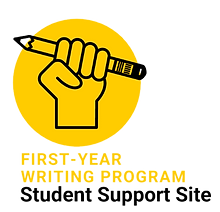ABOUT
THE FIRST-YEAR WRITING PROGRAM

OVERVIEW
The First-Year Writing Program is designed to foster and strengthen the critical reading and writing skills that students need to succeed at the university and beyond. The First-Year Writing Program’s courses not only fulfill part of the university’s Rowan Core (general education) requirements for communicative literacy but also develop students’ awareness of the many forms of discourse happening all around them and engage students’ voices in those public conversations. Students learn to become rhetorically adept writers who can respond to a variety of academic, personal, civic, and professional writing situations.
Through a curriculum that recognizes composition beyond the printed page, Rowan students develop writing skills through critical reading and thinking and by analyzing and communicating complex ideas in varied genres. Students grow as thinkers and writers through the synthesis of research skills, information literacy, critical rhetorical awareness, and creative insights. As a result, students become more effective and more powerful communicators.
COURSES
There are two First-Year Writing courses which are required to complete the Rowan Core composition sequence: College Composition I (COMP 01111) and College Composition II (COMP 01112). CCI is designed to help students understand writing as a process and as a form of conversation. In CCI, students develop their ability to craft a piece of writing that meaningfully communicates with an audience and achieves a specific purpose. After students successfully complete CCI, they take CCII, which is focused on formal argumentation, research strategies, and information literacy. In CCII, students hone their own self-directed writing practices and use various strategies of argumentation to engage in the complexities of selected issues or topics. Along with these courses, the First-Year Writing program also offers additional courses to meet the needs of students in diverse stages of their writing development. Foundations for College Writing (COMP 01103 is a basic writing course that earns free elective credits. FCW is designed to introduce students to the conventions and expectations of college-level writing before they enter the required First-Year Writing sequence. Intensive College Composition I (COMP 01105) is a 4-credit, equivalent course to CCI, which provides additional support and scaffolding to student writers. The First-Year Writing Program also offers Honors sections of CCI and CCII, as well as a version of CCII designed in partnership with the College of Engineering's Sophomore Engineering Clinic, and cohorted sections of CCII for Marketing and Computer Science majors.
More information about First-Year Writing courses and placement
CORE VALUES AND LEARNING OUTCOMES
At the heart of the First-Year Writing Curriculum are the five Core Values. The core values represent ways of thinking that contribute to successful student writing, and they are based on learning outcomes established for first-year composition by the national Council of Writing Program Administrators. Specifically, the program guides students to understand that writing is a practice and a process, that writing and research involve joining an ongoing conversation, that writing is rhetorically situated, that information literacy is an essential part of writing, and that writing comes with ethical responsibilities. All courses are portfolio based, which emphasizes the development of student writing through ongoing revision. Portfolios allow students to collect and present representative samples of their writing from across the semester to demonstrate their growth as writers.
POSITION STATEMENT ON LANGUAGE AND CORRECTNESS
Effective communication occurs when writers understand the impact/effects of language and make linguistic choices that are rhetorically situated and appropriate to a writer’s purpose.
The choice to use gender inclusive language, for example, more accurately reflects and respects the multitude of gender identities in the classroom and in the world. Likewise, our program recognizes that “standard” or “edited academic” English, the dialect of English historically valued by universities, originates from white, middle-class English; faculty and students may want to challenge/avoid reinforcing the idea that this “standard” English is superior, even as they acknowledge that this dialect is still expected in a variety of contexts and has been linked to power and social mobility. Our program believes the following: that linguistic diversity is an asset; that standard written English is not always the best or most appropriate choice for every writing situation, nor for every writer; and that students should be able to make their own rhetorical choices when it comes to language, taking into account context and considering both the risks and rewards that can come from potentially not aligning with audience expectations. We encourage colleagues beyond our program to do the same. Read our full position statement (written for faculty) here.